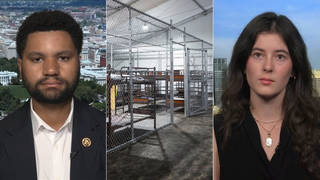The Pentagon and the Trump administration have issued confusing and at times contradictory messages on the United States’ positions on Iraq and Iran amid an escalation of global tensions following the United States’ assassination of Iranian commander Qassem Soleimani.
On Monday, the U.S. Command in Baghdad issued a memo to the Iraqi government that appeared to suggest the United States would withdraw U.S. forces from the country. The memo came after the Iraqi Parliament’s vote to expel all U.S. military forces from Iraq. But only hours after the memo was released, Defense Secretary Mark Esper said the U.S. was not withdrawing troops from Iraq, prompting a wave of questions and confusion that ended only after Chair of the Joint Chiefs General Mark Milley admitted to reporters that the memo was a “poorly worded” draft and that it was released by mistake.
The Pentagon also contradicted President Trump Monday, saying the United States would not attack Iranian cultural sites, and acknowledged that attacking cultural sites without military justification is a war crime. Over the weekend, President Trump threatened to target 52 locations in Iran, including cultural sites, if Iran retaliates against the U.S. Trump said the number 52 was for Iran’s taking of 52 hostages 40 years ago.
The United States also denied a visa to Iranian Foreign Minister Javad Zarif, who was slated to address the United Nations Security Council in New York later this week. Denying him a visa is a violation of a 1947 United States-United Nations agreement. European powers are continuing to call for a de-escalation of the tensions. This is French Foreign Affairs Minister Jean-Yves Le Drian.
Jean-Yves Le Drian: “The situation is serious, very serious. There is a sequence of escalations which is becoming very worrying and which, if it continues, can lead to a situation of conflict. Yes, it’s true. And that’s why we need to mobilize all of our efforts in order to stop this very disturbing process, which can lead us to a disaster, which can then get out of control.”
Meanwhile, there are reports that dozens of people were killed in Iran during a stampede at the funeral procession for General Qassem Soleimani in his hometown in the southeastern city of Kerman. Over a million people in Iran and Iraq have poured into the streets to mourn his death.
The New York Times is reporting that Iran’s Supreme Leader Ayatollah Ali Khamenei told officials in a meeting at Iran’s National Security Council that he wants the retaliation for Suleimani’s assassination to be a direct attack on U.S. interests, carried out by Iranian forces — not Iranian proxies.
And more details have emerged about how the Border Patrol detained and questioned as many as 200 Iranian Americans at the U.S.-Canada border over the weekend. The New York Times reports some of those detained were questioned for hours, including being interrogated about their opinions on the United States and the situation with Iran.











